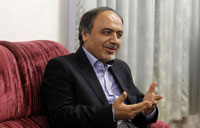Iran asks for UN committee meeting on US ban on envoy
Updated: 2014-04-15 10:41
(Agencies)
|
||||||||
|
 |
The United States said on Friday it would not grant a visa to Hamid Abutalebi because of his links to the 1979-1981 Tehran hostage crisis when radical Iranian students seized the US Embassy and held 52 Americans hostage for 444 days. Abutalebi has said that he acted only as a translator.
"This decision of the US government has indeed negative implications for multilateral diplomacy and will create a dangerous precedence and affect adversely the work of intergovernmental organizations and activities of their Member-States," Iran's Deputy UN Ambassador Hossein Dehghani wrote to the UN Committee on Relations with the Host Country.
"It requires to be well addressed in the Committee on Relations with the Host Country. The Permanent Mission of the Islamic Republic of Iran requests that the committee addresses this issue in an extraordinary and urgent manner," he said.
Cyprus UN Ambassador Nicholas Emiliou, who chairs the 19-member committee dealing with issues including immigration and security, said a meeting would likely be held next week.
"They have specified that they do not request any action on the part of the committee. They simply wish to brief us for the time being at least," Emiliou said of Iran's request.
In the letter Iran expressed its "serious concern over the clear indication of refusal of granting visa by the Host Country authorities in breach of their legal obligations under international law and the Headquarters Agreement."
Iran also asked UN Secretary-General Ban Ki-moon to circulate the letter to the 193-member UN General Assembly.
Officials, diplomats and academics could not recall past cases of the United States denying a UN ambassador's visa.
Under a 1947 "headquarters agreement," the United States is generally required to allow access to the United Nations for foreign diplomats. But Washington says it can deny visas for "security, terrorism, and foreign policy" reasons.
A 1947 Joint Resolution of Congress said nothing should be seen as "diminishing, abridging, or weakening the right of the United States to safeguard its own security and completely control the entrance of aliens" into any part of the United States aside from the UN headquarters.
President Barack Obama had come under strong pressure not to allow Abutalebi into the country to take up his position. Former hostages raised objections to Abutalebi, and a normally divided Congress passed legislation that would ban him.
The White House is still reviewing the legislation, which would bar any UN representative deemed to be behind acts of terrorism or espionage against the United States. It would need Obama's signature to become law.
Most Viewed
Editor's Picks

|

|

|

|

|

|
Today's Top News
Fair shadowed by weak exports
Snowden stories win Pulitzers
Xi calls for joining space and air roles
Utah mom admitted to killing babies
Beijing among 'most global' cities
Foreign investment laws will be revised
China expanding global corn trade
Robotic submarine to search for jet
US Weekly

|

|















